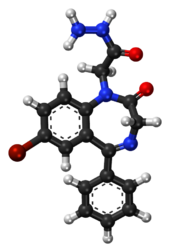Chemistry:Gidazepam
From HandWiki
Short description: Benzodiazepine medication
 | |
 | |
| Clinical data | |
|---|---|
| Trade names | Gidazepam IC |
| Routes of administration | Oral |
| Legal status | |
| Legal status |
|
| Pharmacokinetic data | |
| Metabolism | Hepatic |
| Elimination half-life | 86,7 hours(for active metabolite) |
| Excretion | Renal |
| Identifiers | |
| |
| CAS Number | |
| PubChem CID | |
| DrugBank | |
| ChemSpider | |
| UNII | |
| Chemical and physical data | |
| Formula | C17H15BrN4O2 |
| Molar mass | 387.2 g·mol−1 |
| 3D model (JSmol) | |
| |
| |
| | |
Gidazepam, also known as hydazepam or hidazepam,[1] is a drug which is an atypical benzodiazepine derivative, developed in the Soviet Union.[2][3] It is a selectively anxiolytic benzodiazepine.[4] It also has therapeutic value in the management of certain cardiovascular disorders.[5][6][7][8][9]
Gidazepam is a prodrug for its active metabolite 7-bromo-2,3-dihydro-5-phenyl-1H-1,4-benzodiazepin-2-one (desalkylgidazepam or bromo-nordazepam).[10][11] It is used as an antianxiety drug. Its anxiolytic effects can take several hours to manifest after dosing however, as it is the active metabolite which primarily gives the anxiolytic effects, and Gidazepam's half-life is among the longest of all GABA-ergic agonists.[12]

See also
- Phenazepam—another benzodiazepine widely used in Russia and other CIS countries
- Cinazepam
- Cloxazolam
References
- ↑ Library of Congress (2006). Library of Congress Subject Headings. Library of Congress. pp. 3300–. https://books.google.com/books?id=p61dVgq963kC&pg=PA3300.
- ↑ "[The new Soviet tranquilizer--gidazepam]". Fel'dsher I Akusherka 56 (9): 35–7. September 1991. PMID 1684941.
- ↑ "[Experimental and clinical rationale for complex treatment of mental disorders in clean-up workers of the Chernobyl nuclear plant accident]". Eksperimental'naia i Klinicheskaia Farmakologiia 65 (2): 12–6. Mar 2002. PMID 12109283.
- ↑ "Affinities of gidazepam and its analogs for mitochondrial benzodiazepine receptors". Journal of Receptor and Signal Transduction Research 22 (1–4): 411–20. Feb 2002. doi:10.1081/RRS-120014610. PMID 12503630.
- ↑ "[The effect of gidazepam on the cardiovascular system function in patients with neurotic reactions and in healthy subjects under aggravated conditions]". Eksperimental'naia i Klinicheskaia Farmakologiia 61 (1): 30–2. Jan 1998. PMID 9575408.
- ↑ "[The neuroregulatory modulation of the hemodynamic reactions to physical loading in patients with cardiac arrhythmias]". Terapevticheskii Arkhiv 66 (9): 65–8. 1994. PMID 7992218.
- ↑ "[New pharmacodynamic effects of gidazepam and befol in patients with cardiac arrhythmias]". Eksperimental'naia i Klinicheskaia Farmakologiia 56 (5): 23–7. Sep 1993. PMID 7906171.
- ↑ "[Comparative analysis of antiarrhythmic action and electrophysiological effects of a new benzodiazepine derivative gidazepam and ethacizin in arrhythmias of various genesis]". Kardiologiia 32 (6): 35–7. June 1992. PMID 1405290.
- ↑ "[Comparative anti-arrhythmia effectiveness of activators of body stress-limiting systems in patients with arrhythmia]". Kardiologiia 32 (4): 25–30. April 1992. PMID 1328745.
- ↑ "[Biokinetics of a new prodrug gidazepam and its metabolite]". Biulleten' Eksperimental'noi Biologii I Meditsiny 113 (1): 45–7. January 1992. PMID 1356504.
- ↑ "[Gidazepam biotransformation and pharmacokinetics in different species of animals and man]". Eksperimental'naia i Klinicheskaia Farmakologiia 56 (3): 48–50. May 1993. PMID 8106054.
- ↑ "[The pharmacokinetic aspects of the clinical action of gidazepam]". Eksperimental'naia i Klinicheskaia Farmakologiia 56 (3): 50–2. May 1993. PMID 8106055.
 |

